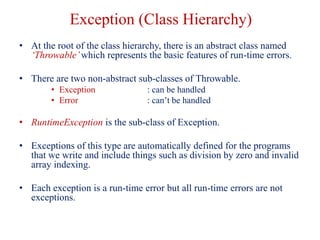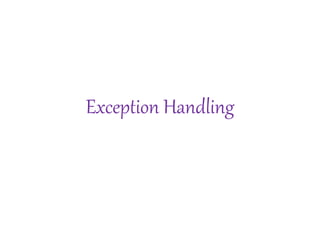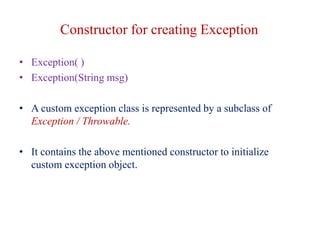L14 exception handling
- 1. Programming in Java Lecture 14: Exception Handling
- 2. Exception
- 3. Introduction • An exception is an event, which occurs during the execution of a program, that disrupts the normal flow of the program's instructions. • A Java exception is an object that describes an exceptional (that is, error) condition that has occurred in a piece of code. • An exception is an abnormal condition that arises in a code sequence at run time. • In other words, an exception is a run-time error.
- 4. Exception Handling class Exception { public static void main (String arr[]) { System.out.println(“Enter two numbers”); Scanner s = new Scanner (System.in); int x = s.nextInt(); int y = s.nextInt(); int z = x/y; System.out.println(“result of division is : ” + z); } }
- 5. Exception Handling • An Exception is a run-time error that can be handled programmatically in the application and does not result in abnormal program termination. • Exception handling is a mechanism that facilitates programmatic handling of run-time errors. • In java, each run-time error is represented by an object.
- 6. Exception (Class Hierarchy) • At the root of the class hierarchy, there is an abstract class named ‘Throwable’which represents the basic features of run-time errors. • There are two non-abstract sub-classes of Throwable. • Exception : can be handled • Error : can’t be handled • RuntimeException is the sub-class of Exception. • Exceptions of this type are automatically defined for the programs that we write and include things such as division by zero and invalid array indexing. • Each exception is a run-time error but all run-time errors are not exceptions.
- 7. Throwable Exception Error Run-time Exception - VirtualMachine • IOEXception - ArithmeticException - NoSuchMethod • SQLException - ArrayIndexOutOf - StackOverFlow BoundsException - NullPointerException Checked Exception Unchecked Exception
- 8. Checked Exception • Checked Exceptions are those, that have to be either caught or declared to be thrown in the method in which they are raised. Unchecked Exception • Unchecked Exceptions are those that are not forced by the compiler either to be caught or to be thrown. • Unchecked Exceptions either represent common programming errors or those run-time errors that can’t be handled through exception handling.
- 9. Commonly used sub-classes of Exception • ArithmeticException • ArrayIndexOutOfBoundsException • NumberFormatException • NullPointerException • IOException
- 10. Commonly used sub-classes of Errors • VirualMachineError • StackOverFlowError • NoClassDefFoundError • NoSuchMethodError
- 11. Uncaught Exceptions class Exception_Demo { public static void main(String args[]) { int d = 0; int a = 42 / d; } } • When the Java run-time system detects the attempt to divide by zero, it constructs a new exception object and then throws this exception. • once an exception has been thrown, it must be caught by an exception handler and dealt with immediately.
- 12. • In the previous example, we haven’t supplied any exception handlers of our own. • So the exception is caught by the default handler provided by the Java run-time system. • Any exception that is not caught by your program will ultimately be processed by the default handler. • The default handler displays a string describing the exception, prints a stack trace from the point at which the exception occurred, and terminates the program. java.lang.ArithmeticException: / by zero at Exc0.main(Exc0.java:4)
- 13. Why Exception Handling? • When the default exception handler is provided by the Java run-time system , why Exception Handling? • Exception Handling is needed because: – it allows to fix the error, customize the message . – it prevents the program from automatically terminating
- 15. Keywords for Exception Handling • try • catch • throw • throws • finally
- 16. Keywords for Exception Handling try • used to execute the statements whose execution may result in an exception. try { Statements whose execution may cause an exception } Note: try block is always used either with catch or finally or with both.
- 17. Keywords for Exception Handling catch • catch is used to define a handler. • It contains statements that are to be executed when the exception represented by the catch block is generated. • If program executes normally, then the statements of catch block will not executed. • If no catch block is found in program, exception is caught by JVM and program is terminated.
- 18. class Divide{ public static void main(String arr[]){ try { int a= Integer.parseInt(arr[0]); int b= Integer.parseInt(arr[1]); int c = a/b; System.out.println(“Result is: ”+c); } catch (ArithmeticException e) {System.out.println(“Second number must be non-zero”);} catch (NumberFormatException n) {System.out.println(“Arguments must be Numeric”);} catch (ArrayIndexOutOfBoundsException a) {System.out.println(“Invalid Number of arguments”);} } }
- 19. Nested Try’s class NestedTryDemo { public static void main(String args[]){ try { int a = Integer.parseInt(args[0]); try { int b = Integer.parseInt(args[1]); System.out.println(a/b); } catch (ArithmeticException e) { System.out.println(“Div by zero error!"); } } catch (ArrayIndexOutOfBoundsException) { System.out.println(“Need 2 parameters!"); } }}
- 20. Defining Generalized Exception Handler • A generalized exception handler is one that can handle the exceptions of all types. • If a class has a generalized as well as specific exception handler, then the generalized exception handler must be the last one.
- 21. class Divide{ public static void main(String arr[]){ try { int a= Integer.parseInt(arr[0]); int b= Integer.parseInt(arr[1]); int c = a/b; System.out.println(“Result is: ”+c); } catch (Throwable e) { System.out.println(e); } } }
- 22. Keywords for Exception Handling throw • used for explicit exception throwing. throw(Exception obj); ‘throw’ keyword can be used: • to throw user defined exception • to customize the message to be displayed by predefined exceptions • to re-throw a caught exception • Note: System-generated exceptions are automatically thrown by the Java run-time system.
- 23. class ThrowDemo { static void demo() { try { throw new NullPointerException("demo"); } catch(NullPointerException e) { System.out.println("Caught inside demo."); throw e; // rethrow the exception } } public static void main(String args[]) { try { demo(); } catch(NullPointerException e) { System.out.println("Recaught: " + e); } } }
- 24. Keywords for Exception Handling throws • A throws clause lists the types of exceptions that a method might throw. type method-name(parameter-list) throws exception-list { // body of method } • This is necessary for all exceptions, except those of type Error or Runtime Exception, or any of their subclasses. • All other exceptions that a method can throw must be declared in the throws clause. If they are not, a compile-time error will result.
- 25. import java.io.*; public class ThrowsDemo { public static void main( String args []) throws IOException { char i; BufferedReader br = new BufferedReader(new InputStreamReader(System.in)); System.out.println("Enter character, 'q' to quit"); do{ i = (char) br.read(); System.out.print(i); }while(i!='q'); } }
- 26. Keywords for Exception Handling Finally • finally creates a block of code that will be executed after a try/catch block has completed and before the code following the try/catch block. • The finally block will execute whether or not an exception is thrown. • If an exception is thrown, the finally block will execute even if no catch statement matches the exception.
- 27. • If a finally block is associated with a try, the finally block will be executed upon conclusion of the try. • The finally clause is optional. However, each try statement requires at least one catch or a finally clause.
- 28. Chained Exceptions • Throwing an exception along with another exception forms a chained exception.
- 29. Chained Exceptions public class ChainedExceptionDemo { public static void main(String[] args) { try { method1(); } catch (Exception ex) { ex.printStackTrace();} } public static void method1() throws Exception { try { method2(); } catch (Exception ex) { throw new Exception("New info from method1”, ex); } } public static void method2() throws Exception { throw new Exception("New info from method2"); } }
- 30. Defining Custom Exceptions • We can create our own Exception sub-classes by inheriting Exception class. • The Exception class does not define any methods of its own. • It inherits those methods provided by Throwable. • Thus, all exceptions, including those that we create, have the methods defined by Throwable available to them.
- 31. Constructor for creating Exception • Exception( ) • Exception(String msg) • A custom exception class is represented by a subclass of Exception / Throwable. • It contains the above mentioned constructor to initialize custom exception object.
- 32. class Myexception extends Throwable { public Myexception(int i) { System.out.println("you have entered ." +i +" : It exceeding the limit"); } }
- 33. public class ExceptionTest { public void show(int i) throws Myexception { if(i>100) throw new Myexception(i); else System.out.println(+i+" is less then 100 it is ok"); } public static void main(String []args){ int i=Integer.parseInt(args[0]); int j=Integer.parseInt(args[1]); ExceptionTest t=new ExceptionTest(); try{ t.show(i); t.show(j); } catch(Throwable e) { System.out.println("catched exception is "+e); } } }



![Exception Handling
class Exception
{
public static void main (String arr[])
{
System.out.println(“Enter two numbers”);
Scanner s = new Scanner (System.in);
int x = s.nextInt();
int y = s.nextInt();
int z = x/y;
System.out.println(“result of division is : ” + z);
}
}](https://image.slidesharecdn.com/l14-exceptionhandling-150407143123-conversion-gate01/85/L14-exception-handling-4-320.jpg)






![Uncaught Exceptions
class Exception_Demo
{
public static void main(String args[])
{
int d = 0;
int a = 42 / d;
}
}
• When the Java run-time system detects the attempt to divide by
zero, it constructs a new exception object and then throws this
exception.
• once an exception has been thrown, it must be caught by an
exception handler and dealt with immediately.](https://image.slidesharecdn.com/l14-exceptionhandling-150407143123-conversion-gate01/85/L14-exception-handling-11-320.jpg)






![class Divide{
public static void main(String arr[]){
try {
int a= Integer.parseInt(arr[0]);
int b= Integer.parseInt(arr[1]);
int c = a/b;
System.out.println(“Result is: ”+c);
}
catch (ArithmeticException e)
{System.out.println(“Second number must be non-zero”);}
catch (NumberFormatException n)
{System.out.println(“Arguments must be Numeric”);}
catch (ArrayIndexOutOfBoundsException a)
{System.out.println(“Invalid Number of arguments”);}
}
}](https://image.slidesharecdn.com/l14-exceptionhandling-150407143123-conversion-gate01/85/L14-exception-handling-18-320.jpg)
![Nested Try’s
class NestedTryDemo {
public static void main(String args[]){
try {
int a = Integer.parseInt(args[0]);
try {
int b = Integer.parseInt(args[1]);
System.out.println(a/b);
}
catch (ArithmeticException e)
{
System.out.println(“Div by zero error!");
}
}
catch (ArrayIndexOutOfBoundsException) {
System.out.println(“Need 2 parameters!");
}
}}](https://image.slidesharecdn.com/l14-exceptionhandling-150407143123-conversion-gate01/85/L14-exception-handling-19-320.jpg)

![class Divide{
public static void main(String arr[]){
try {
int a= Integer.parseInt(arr[0]);
int b= Integer.parseInt(arr[1]);
int c = a/b;
System.out.println(“Result is: ”+c);
}
catch (Throwable e)
{
System.out.println(e);
}
}
}](https://image.slidesharecdn.com/l14-exceptionhandling-150407143123-conversion-gate01/85/L14-exception-handling-21-320.jpg)

![class ThrowDemo
{
static void demo()
{
try {
throw new NullPointerException("demo");
}
catch(NullPointerException e)
{
System.out.println("Caught inside demo.");
throw e; // rethrow the exception
}
}
public static void main(String args[])
{
try {
demo();
}
catch(NullPointerException e)
{
System.out.println("Recaught: " + e);
}
}
}](https://image.slidesharecdn.com/l14-exceptionhandling-150407143123-conversion-gate01/85/L14-exception-handling-23-320.jpg)

![import java.io.*;
public class ThrowsDemo
{
public static void main( String args []) throws IOException
{
char i;
BufferedReader br = new BufferedReader(new
InputStreamReader(System.in));
System.out.println("Enter character, 'q' to quit");
do{
i = (char) br.read();
System.out.print(i);
}while(i!='q');
}
}](https://image.slidesharecdn.com/l14-exceptionhandling-150407143123-conversion-gate01/85/L14-exception-handling-25-320.jpg)



![Chained Exceptions
public class ChainedExceptionDemo {
public static void main(String[] args) {
try { method1(); }
catch (Exception ex) { ex.printStackTrace();} }
public static void method1() throws Exception {
try { method2(); }
catch (Exception ex) {
throw new Exception("New info from method1”, ex); } }
public static void method2() throws Exception {
throw new Exception("New info from method2");
} }](https://image.slidesharecdn.com/l14-exceptionhandling-150407143123-conversion-gate01/85/L14-exception-handling-29-320.jpg)



![public class ExceptionTest {
public void show(int i) throws Myexception {
if(i>100)
throw new Myexception(i);
else
System.out.println(+i+" is less then 100 it is ok");
}
public static void main(String []args){
int i=Integer.parseInt(args[0]);
int j=Integer.parseInt(args[1]);
ExceptionTest t=new ExceptionTest();
try{
t.show(i); t.show(j);
}
catch(Throwable e) {
System.out.println("catched exception is "+e);
}
}
}](https://image.slidesharecdn.com/l14-exceptionhandling-150407143123-conversion-gate01/85/L14-exception-handling-33-320.jpg)
